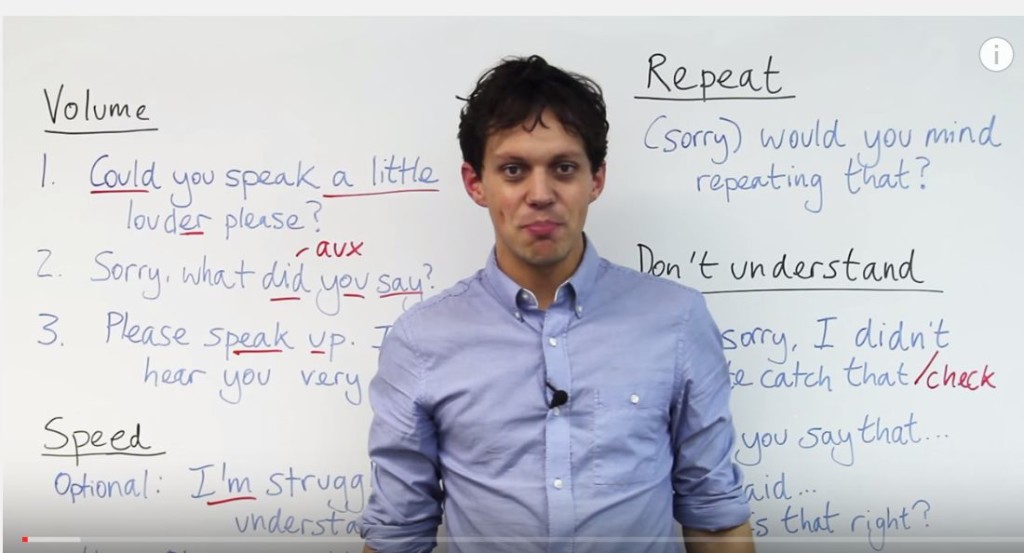Если Вас беспокоит как говорить по телефону на английском языке, то в этом Вы не одиноки. Это наша общая беда. Все студенты сталкиваются с этим при изучении нового языка.
В этом уроке Вы узнаете, как вежливо попросить другого человека, чтобы он говорил медленнее и громче. Вы также можете запомнить некоторые полезные выражения для проверки понимания как, «я сожалею. Я не расслышал, что.»
Так что не тратьте время, и переходите к уроку, как преодолеть свой страх говорить по телефону!
Hello. My name’s Benjamin. I’m a teacher. And today we’re going to deal with talking on the phone and trying to understand what they are saying. We’re going to ask them to raise their voices, to slow down, we’re going to ask them to repeat themselves, and we’re going to cover what to do when you just don’t understand.
So, I’m hungry. I’ve been working all day. I need to call a pizza. That’s it. Okay. Huh? I can’t hear them. They’re being too quiet. They’re quiet as a mouse. So I need to say: «Could you speak a little louder please?» Okay? So: «Could», this is a polite way of asking a question. Okay? «Yeah, hang on. I’m… Sorry. I’m just talking to my friends on the internet. Okay? Hang on. I’ll be a couple of minutes.» So this is a polite way of speaking. «Could you speak a little louder?» A little, a little louder. Okay? «Please? Could you speak a little louder please?»
Or another way of saying this: «Sorry, what did you say?» I didn’t hear what they said. So this is interesting. Look at the word order, here. «What did you say?» I put my auxiliary verb «did», «What did you say?» before the subject, here. «Sorry, what did you say?» I’m asking them to repeat. Okay?
Or, last one: «Please speak up.» Please. A little louder. I need to hear. «Please speak up.» Speak up. Okay? If you don’t remember anything else: «speak up» is more volume. Okay? «Please speak up. I can’t hear you very well.» «I can’t», so this obviously short for: «I cannot hear you very well.» I’ll just tell him. «Sorry, please speak up. I can’t hear you very well.» Okay, he’s speaking nice and loudly now, I can hear him.
But now he’s talking too fast, he’s saying: «Blablablablablablablablablablablab
Great, so now they’re talking nice and loudly and they’re talking slowly, which is what we want. I can understand now. «Huh? What? Huh?» They said something. I… I didn’t… I didn’t… I didn’t understand, so I say… «Yeah. One minute.» «Sorry, would you mind repeating that?» Okay? This is another polite way of phrasing: «Would you mind? Do you mind?» It’s a nice way of asking someone to do something. Repeating, «repeat» with «ing» that, what they just said. Okay? We’ll try this. «Sorry. Would you mind repeating that please?» Busy, oh they’re very busy at the moment. Okay, that’s fine.
This pizza company, I don’t understand what they’re saying again. What’s going on? So… «Yeah, yeah, yeah. One sec. One sec.» So I need to say: «I’m sorry, I didn’t quite catch that.» Okay? So: «I’m sorry», so short for: «I am sorry, I didn’t»-didn’t — did not-«quite» not quite, just a little bit… «I didn’t quite catch», catch, if I catch something, I understand, I get it. «I’m sorry, I didn’t… I didn’t quite catch that.» Okay? «Catch» means to understand, to hear. «I’m sorry, I didn’t quite catch that.»
«Did you say that you…? Did you say that you only do vegetarian pizzas?» Okay? «Did you say that…?» So I am… I am now repeating what they said. «Did you say…?» okay? Past simple. You did. «Did you say…?» But with… This is the auxiliary again. «Did you say that you only do vegetarian peache-, pizzas?» Or I could say: «Let me just check that. You said that you only do vegetarian pizzas. Is that right?» Okay? So I’m checking. «Is that right?» Is that what you said? Okay? «Yes. Sorry, sir. We only do vegetarian pizzas.» Okay? And then I can choose vegetarian and I say: «Yes», or I say: «No», and I choose someone else. Okay?
So I hope that gives you a better idea of how to really understand your telephone conversations. Okay? Just to recap: we got ways of asking them to raise the volume a little, to slow down, to repeat themselves, and what to do if you think they’d said something but you’re not quite sure.
